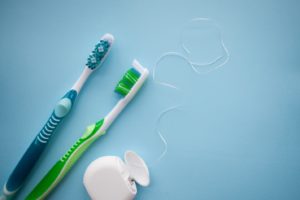
You know that both brushing and flossing are keys to maintaining a clean, healthy mouth. Both habits help to remove plaque from teeth and stop harmful bacteria from leading to gum disease and other serious problems. But have you ever wondered whether you should brush or floss first when you’re going through your daily routine? A periodontist in Frisco is here to discuss the results of a study, published in the Journal of Periodontology, that set out to examine this issue. You might just decide to switch up your daily oral hygiene routine!
The Study’s Parameters
The researchers sought to find out whether brushing followed by flossing or flossing followed by brushing has a greater impact on fluoride retention and the amount of plaque on teeth. The randomized study examined how the brush-floss sequence affected the teeth of 25 dental students.
During the first phase of the study, the subjects brushed first and then flossed. During the second phase, they flossed first and then brushed. Periodically, the researchers measured the amount of interdental plaque on the teeth as well as fluoride concentrations in plaque residue.
The Results
The researchers discovered that when the students flossed first, they had significantly less interdental plaque (plaque in the spaces between the teeth) than when they brushed first. They also had higher concentrations of fluoride in the plaque that remained. The higher fluoride concentrations were likely due to the fact that flossing first removed food particles from between the teeth and gave the fluoride in the toothpaste a greater opportunity to bond with the plaque residue.
These findings are significant because:
- Plaque contains acids that weaken tooth enamel and lead to cavities. Removing as much of it as possible is a key to maintaining a healthy mouth.
- Fluoride has been proven to aid in cavity prevention, and it is most effective when teeth have prolonged exposure to it. Higher concentrations of fluoride in dental plaque residue may lead to stronger teeth and a lower risk of dental decay.
Should You Adjust Your Routine?
The study was the first of its kind, and its subjects were all dental students who have a high level of skill in brushing and flossing techniques. Therefore, it is impossible to say how a study conducted among the generalized population would turn out. Still, it certainly won’t hurt your oral health if you decide to floss before you brush during your nightly oral hygiene routine. Given the results of the study, there is even a chance that you’ll be doing your smile a big favor!
About the Author
Dr. Zachary Carnow began his career as a general dentist, but he then decided to pursue advanced training in periodontics. As an expert on general oral health and gum health, he seeks to encourage all of his patients to adopt healthy habits that can spare them from the discomfort of dental problems. To learn more about Dr. Carnow and how he may be able to benefit your smile’s well-being, contact our office at 214-619-4990.
